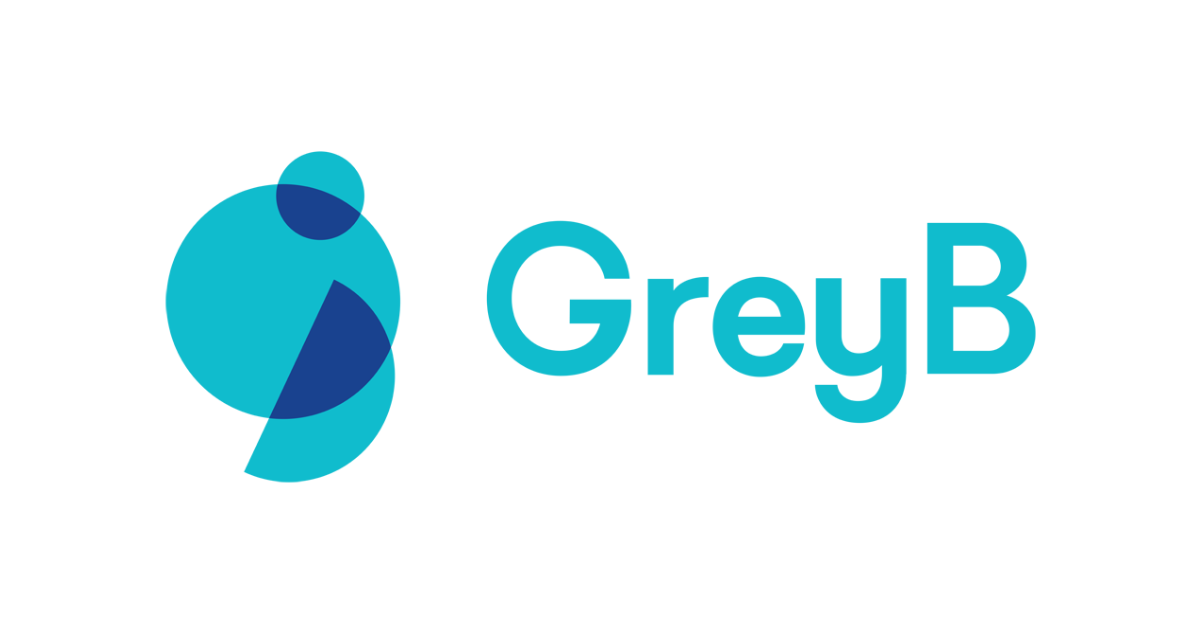Waterless Cosmetics: A Multi-Billion Dollar Beauty Trend for 2024
Skyquest expects the market share of waterless cosmetic products to grow to 20 billion USD by 2030.
Waterless products have broken out of South Korean markets and have slowly become popular in the West since 2015, mainly due to more eco-conscious consumers. Since these products are not diluted with water, they need minimal preservatives, if at all. Mintel found that 27% of present-day consumers are now trying to reuse or use less water. Waterless cosmetics will be an easy sell to this demographic.
The waterless concept also makes these products more compact and lighter to transport, meaning a lower carbon footprint. This is a huge marketing point for the cosmetics industry, which has long been known for overly packaged, unsustainable items.
This report will dive into the leading innovators and their recent innovations in waterless cosmetic products.
Discover all the other cutting-edge cosmetic trends in our comprehensive report. Fill out this form to get the report straight to your inbox.
Top companies innovating waterless cosmetic products
Among the top patent filing companies, it’s evident that L’OREAL is rapidly growing its IP portfolio. In 2022 alone, it filed 5 times more patents than its closest competitor, Unilever. Furthermore, L’OREAL had the highest growth of 121% in patent filings and 107% in grants by August Q3 of 2023.

One of L’OREAL’s recent patents (WO2020154779) is on formulating anhydrous sunscreen (rich in antioxidants) using carnauba wax that protects the formula from oxidation and avoids sensory degradation. They also hold a patent on the composition and a non-therapeutic process for the care of keratinous materials.
Procter & Gamble had some issues with its dry shampoos and conditioners from its Pantene and Herbal Essence (Old Spice) due to the presence of toxic compounds like Benzene. The product had to be recalled. They’ve pledged to restore more water than is consumed at P&G manufacturing sites in 18 water-stressed areas worldwide by 2030.
New Startups with Waterless Cosmetic Products
The startups listed below have made headlines with their new, waterless cosmetic formulations, sustainable manufacturing practices, and unconventional approaches to being eco-friendly.
SBTRCT
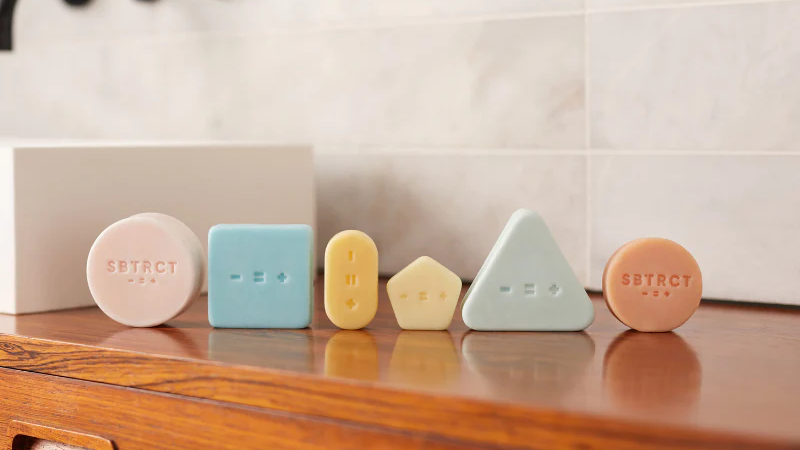
SBTRCT is a new, waterless brand by Ben Grace, the former managing director of British skincare company Bulldog. They make planet-based bar soap and home-compostable skincare products that are completely waterless and do not contain plastic or palm oil. SBTRCT claims its products, on average, last twice as long as traditional formulations.
Recommended reading: 7 Startups with Sustainable Palm Oil Alternative Solutions
Green+Bare

Launched in 2020, Green+Bare is an Australian green beauty brand aiming to develop a range of waterless beauty products. The brand has developed floral waters, plant oils, and clay masks. Its star product, clay masks, come in five varieties and are manufactured from purple Brazilian clay and hibiscus.
They are sold in powder form and can be mixed with water before usage. Green+Bare aims to develop more products, like powdered cleaners, cleaning oils, and solid bars, in the future.
Everist Inc.
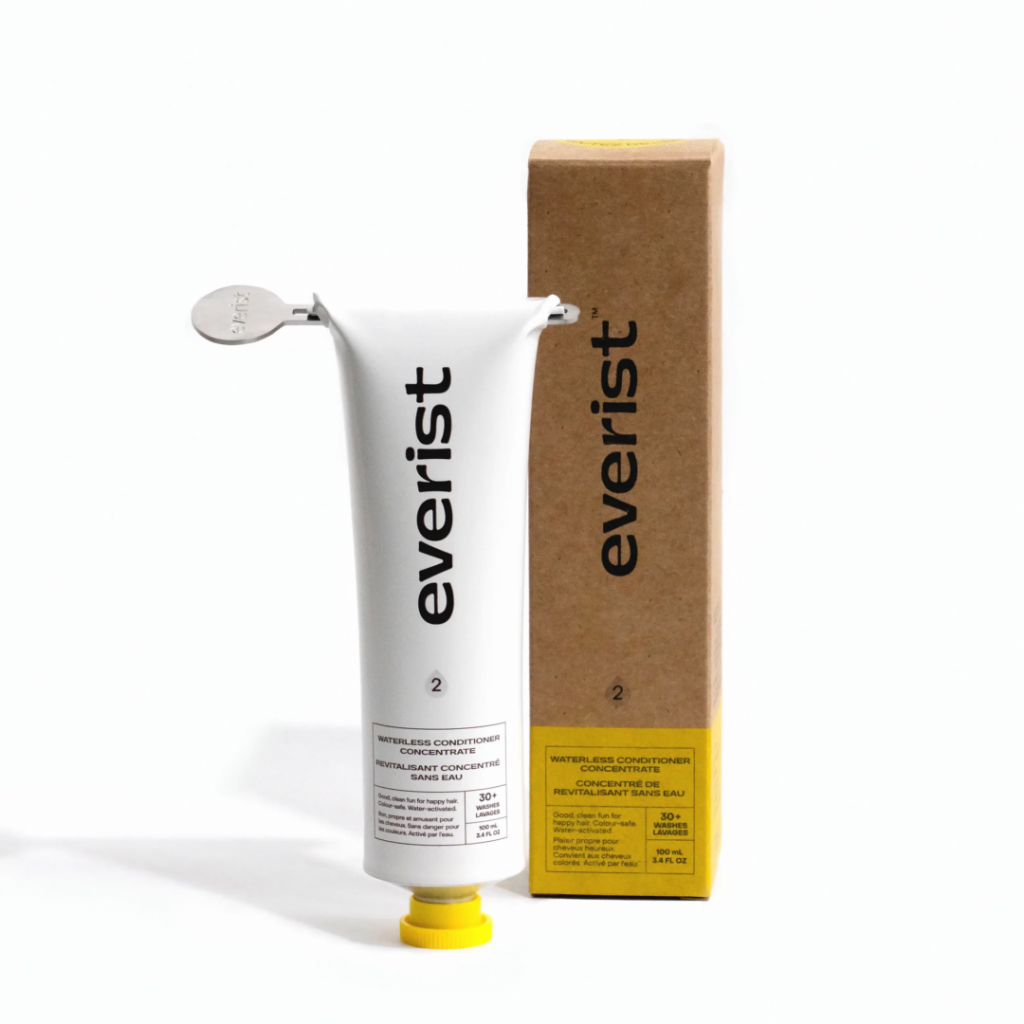
Everist Inc. unveiled its patent-pending haircare concentrates in early 2021. This zero-waste beauty company entered the market with the waterless haircare concept and expanded it to the body care category. The brand’s debut line of haircare products features a waterless shampoo concentrate and a waterless conditioner concentrate packed in 100ml travel-friendly aluminum tubes. As the products are three times concentrated, this is the equivalent of 300-ml sizes of traditional shampoo and conditioner.
Mirage Waterless LLC

Mirage Waterless LLC, a New York-based startup, makes a unique powdered shampoo that can be applied to the hair by adding a few drops of water and forming a paste.
In addition to being a waterless product, it is plastic-free and sustainable – the aluminum packaging is infinitely recyclable and travel-friendly. All other packaging materials, including the shipping label, are recyclable and compostable.
Ethique
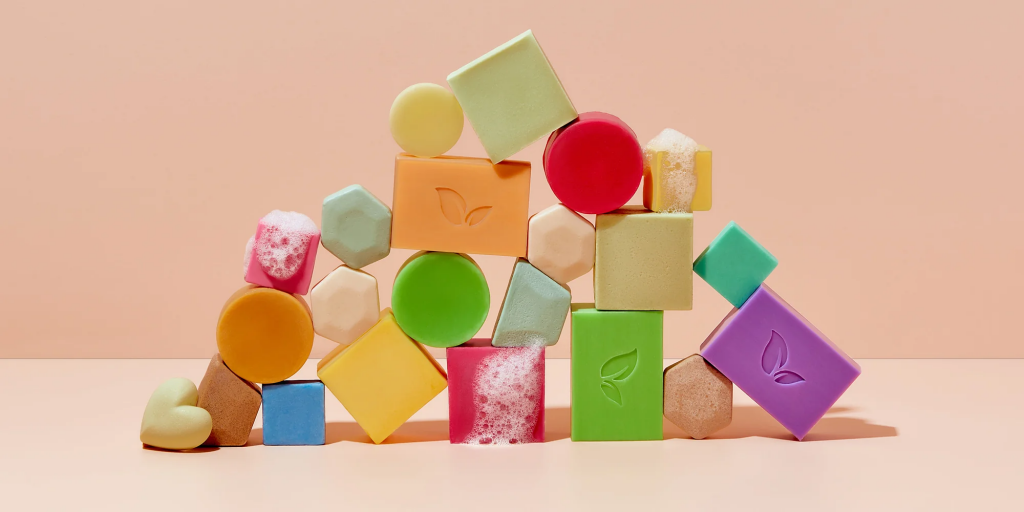
Ethique, a New Zealand-based company that sells skincare products, has just launched home-compostable lipsticks. They offer a range of handcrafted solid beauty bars, including shampoos, conditioners, and face & body bars. The company proudly claims that besides being waterless, its bars have an average carbon footprint of a mere 8% of that of bottled products.
Pinch of Colour
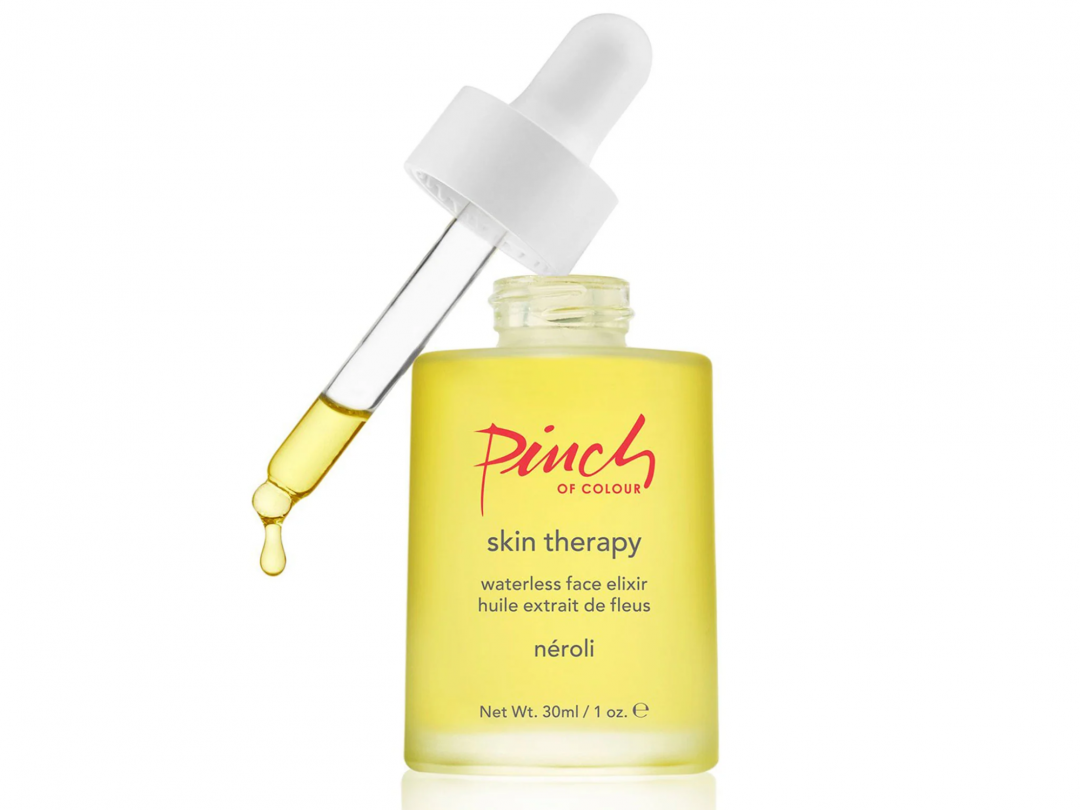
Pinch of Colour makes sustainable cosmetics using botanicals, hydrating natural oils, and skin-loving fruit butter instead of water for moisturization. Launched in 2016, they claim to be the world’s first waterless beauty brand.
They offer various lip colors, oils, and face tint products, all naturally sourced and free of water content. They undertake several philanthropic initiatives with their business proceeds, such as donating safe drinking water to impoverished communities worldwide in collaboration with Healing Waters Organization, Clean Water for Children, Ekenywa, and Blue Angel Charity.
Recommended Read: Sustainable Beauty: Transforming Kitchen Staples into Innovative Cosmetic Ingredients
True Skincare
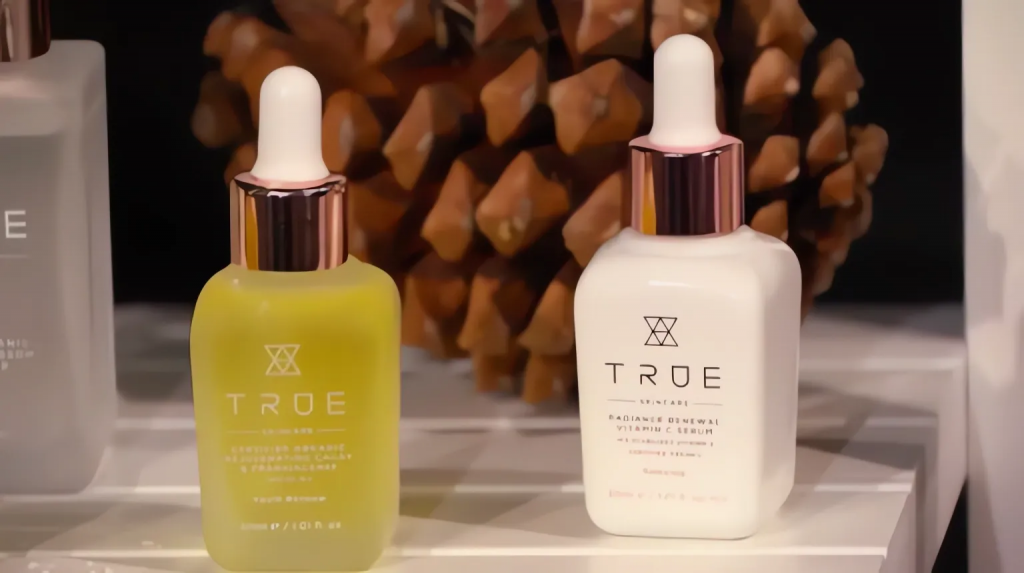
UK-based startup True Skincare first made rounds after raising £75,000 in funding via Dragon’s Den, an entrepreneurial reality TV show in 2021. The company specializes in affordable, waterless skincare cosmetics like natural cleansing oils in the £12 – £18 price range. They wish to make sustainable beauty products accessible to everyone in this post-pandemic economy.
Acquisitions and Collaborations in the Waterless Cosmetic Industry
Taiki USA & Stellenbosch Nanofiber Co.
Taiki USA, a global supplier of sheet face masks, with its Bōshi Fiber Technology, in collaboration with Stellenbosch Nanofiber Co, has developed several waterless beauty products. Bōshi Fiber uses nanofiber manufacturing to create high-performing, instantly dissolving waterless products. Waterless Bōshi Fiber is a patented electrospun nanofiber technology that uses common water-soluble polymers like hyaluronic acid to encapsulate key active ingredients. These simple formulations require less packaging and provide a more sustainable solution for consumers.
Additionally, Taki holds a patent for a sheet-shaped pack cosmetic with a two-component system designed not to drip even when faced with excessive water content. They achieve this through a water-insoluble gel sheet made of amylose.
This gel sheet is flexible and strong and has good adhesion to the skin. This sheet cosmetic comes with high liquid content without dripping and removes sebum from the skin’s surface using amylose.
Beiersdorf acquired Stop the Water While Using Me!

Beiersdorf, a German personal-care company, acquired the natural cosmetics brand Stop The Water While Using Me, whose product range comprises waterless body & hair care products and oral hygiene items.
Nina Witt, chief executive officer of the brand, said, “Beiersdorf will provide us with a working environment where we can independently advance our purpose work, spread the message of Stop the Water While Using Me! and maximize our sustainability ambitions with a strong partner at our side.”
The “Stop the Water While Using Me!” brand will operate independently from Beiersdorf, further bolstering the beauty giant’s portfolio in the natural cosmetics segment and aiding the parent company’s sustainable focus as part of its CARE+ strategy.
Future of Waterless Cosmetic Products
Current market growth trends indicate a promising future for waterless products in the cosmetics industry. The adoption of waterless cosmetics will continue to grow at a CAGR of 13% by 2030. Activity from large market players like Unilever launching several new waterless and water-activated products reinforces the growth predictions of this landscape for the foreseeable future.
However, waterless products are only one among the many more innovative trends in the cosmetic industry in 2024. Exploring the other trends will help you understand the upcoming market and gain a competitive edge in 2024.
We are compiling the cosmetics innovation trends to watch in 2024. Fill out the form below to get the exclusive report delivered via email.
Authored By: Hemanth Shenoy, Market Research


